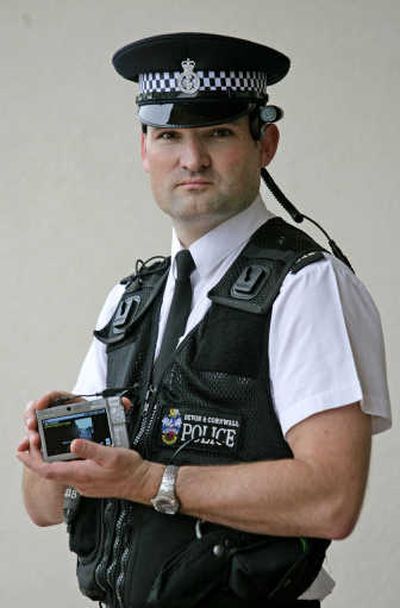Britain outfits police with helmet cameras

LONDON – Britain is taking its surveillance to a new level, strapping video cameras to the helmets of its famed bobbies – a move the government says will cut down on paperwork and help prosecute criminals.
By providing dramatic footage of victims, suspects and witnesses, judges and jurors will be able to “see and hear the incident through the eyes and ears of the officer at the scene,” Minister of State for Security Tony McNulty said.
The Home Office said it was allocating $6 million to fund the devices for Britain’s 42 police forces – enough to buy more than 2,000 cameras.
Police already use handheld cameras to monitor crowded events and the new head-mounted devices, worn around the ear or clipped on a helmet, have been used on a trial basis in Plymouth since 2005. Similar cameras are used by security guards at sports venues to hunt for soccer hooligans.
Britain is not the first country to use such cameras, versions of which have been tested in Denmark. But the national rollout will tighten Britain’s web of video surveillance, already the most extensive in the world. The country is watched over by a network of some 4 million closed-circuit cameras, and privacy advocates complain the average Briton is recorded as many as 300 times a day.
In a report on the Plymouth pilot project published by the Home Office on Thursday, policemen praised the head-held cameras for deterring bad behavior and providing excellent evidence against crooks. They said rowdy youths quickly calmed when they realized they were being filmed, and those arrested for drunkenness seldom challenged police when shown videos of their behavior.
The Association of Chief Police Officers, an independent body of senior police officials in England, Wales and Northern Ireland, gave the devices a tepid welcome, cautioning that courts might someday expect everything police said to be backed by video evidence.
The civil rights group Liberty praised the guidelines for using the devices included in the Home Office report. Spokeswoman Jen Corlew noted that police were instructed to inform members of the public they were being recorded and that the footage not being used in an investigation had to be erased within a month of its creation.
The American Civil Liberties Union expressed concern, predicting the United States would soon follow Britain’s lead and subject Americans to even more video surveillance.
“Head-mounted cameras are a little bit of a double-edged sword when it comes to civil liberties,” said Barry Steinhardt, director of the ACLU’s Technology and Liberty program in Washington, D.C.
“They record police misconduct, improper interrogations and seem to have an effect on having police officers kept in line. But this just becomes another extension of widespread video surveillance,” he said.
Steinhardt predicted the U.S. would soon give police the same power since America already has followed the example of Britain, “the world’s innovator when it comes to surveillance and surveillance technology.”